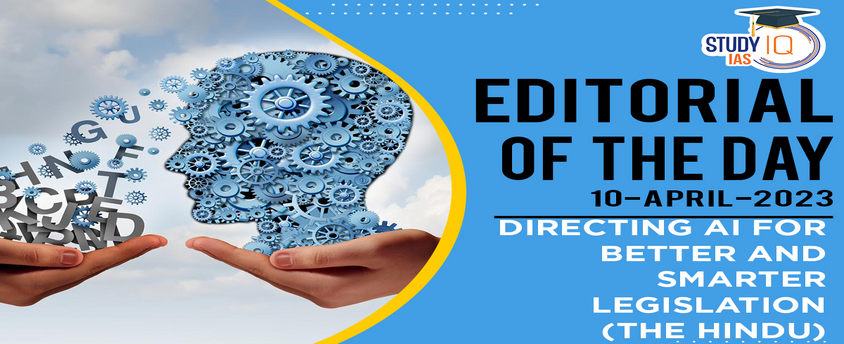Directing AI for better and smarter legislation
11, Apr 2023

Prelims level : Science & Technology
Mains level : GS-III Science & Technology - Awareness in the fields of it, Space, Computers, Robotics, Nano-Technology, Bio-Technology, Pharma Sector & Health Science
Why in News?
- Artificial intelligence (AI) has emerged as a significant technological advancement that can revolutionise various fields. In recent years, it has been increasingly applied in the field of law, particularly in drafting and implementing legislation.
- India, being the world’s largest democracy and a country with a vast population, could significantly benefit from the use of AI in legislation.
- AI has the potential to create better, more efficient, and smarter legislation that could help address the challenges that the country faces.
- The COVID-19 pandemic has given a strong thrust to the Digital India initiative and a digitisation of services. This momentum needs to be kept up and utilised in the field of law, policy-making, and parliamentary activities, harnessing the power of AI.
Challenges in the Current Legislative Process in India:
- The legislative process in India faces several challenges, including delays, inefficiencies, and lack of transparency. The current legislative process is time-consuming and involves multiple stages, including drafting, review, and approval.
- The legislative process involves multiple stakeholders, including lawmakers, bureaucrats, and stakeholders.
- The lack of coordination among these stakeholders can lead to delays, redundancies, and inconsistencies in the legislation.
- Transparency is another challenge in the current legislative process in India. The legislative process is often opaque, with limited access to information for the public.
- This lack of transparency can lead to mistrust among the public and limit their participation in the legislative process.
Applications of AI in Lawmaking:
- One of the most significant applications of AI in the lawmaking process is legal research and analysis.
- AI-powered tools can be used to analyse vast amounts of legal data, such as case law, statutes, and regulations.
- This can help lawmakers identify legal precedents and trends and make more informed decisions when creating legislation.
- AI tools can also be used to analyse the impact of legislation on different sectors, such as the economy, environment, and society.
- This can help lawmakers create legislation that is well-informed and addresses the needs of all stakeholders
- AI can also be used to draft legislation. AI-powered tools can help lawmakers create legislation that is clear, concise, and free of errors.
- These tools can also ensure that legislation complies with legal principles, such as due process and equal protection.
- AI tools can also help lawmakers identify potential conflicts and ambiguities in legislation and suggest revisions to address these issues.
- AI can also be used to review legislation and identify potential issues, such as conflicting provisions or redundant clauses.
- AI can also be used to increase public participation in the lawmaking process. AI-powered tools can provide greater access to information about legislation and its implications.
- This can help increase public awareness of the legislation and encourage public feedback and participation.It can also help in flagging laws that are outdated in the present circumstances and which require amendment.
- For example, ‘The Epidemic Diseases Act, 1897’ failed to address the COVID-19 pandemic situation during its peak due to its outdated policies.
Global Scenario:
- Many Parliaments across the world are now actively experimenting with AI-powered assistants.
- The House of Representatives in the United States has introduced an AI tool to automate the process of analysing differences between Bills, amendments and current laws.
- The Netherlands House of Representatives, for instance, has implemented the “Speech2Write” system which converts voice to text and also “translates” voice into written reports. Japan’s AI tool assists in the preparation of responses for its legislature and also helps in the automatic selection of relevant highlights in parliamentary debates.
- Brazil has developed an AI system called Ulysses which supports transparency and citizen participation.
Recommendations for Using AI in Legislation:
- India must codify its law for effective use of AI in legislation as there is a huge translation gap between law-making, law-implementing and law-interpreting organisations.
- India Code portal which contains all the Central legislations cannot be entirely relied upon as a ‘single source of truth’.
- The interface should contain a complete chain, right from the parent Act to the subordinate pieces of legislation passed by the union government and the amendment notifications, enabling any entity to get a 360° view.
- Such a requirement becomes more critical in special situations such as COVID-19. For example, in measures related to COVID-19, the central government issued over 900 notifications while State governments issued over 6,000 notifications on the subject.
- One of the most critical recommendations is to ensure that AI is used in a way that is compatible with the values and principles of democracy.
- The use of AI should not compromise the principles of accountability, transparency, and public participation.Collaboration among stakeholders is also crucial for the effective use of AI in legislation. The use of AI should not be limited to lawmakers but should also involve other stakeholders, such as civil society organisations and the public.
- This can help ensure that the legislation reflects the needs and concerns of all stakeholders.It is also essential to ensure that the use of AI in legislation is accompanied by appropriate legal frameworks and ethical standards.
- This can help ensure that the use of AI is fair, transparent, and accountable.






